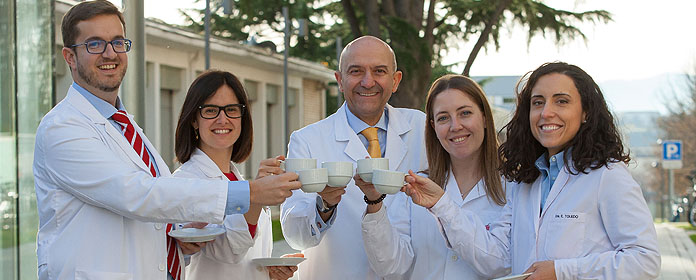University scientists link higher coffee consumption with lower mortality
The American Journal of Clinical Nutrition publishes a research conducted on 20,000 volunteers from all over Spain.

Researchers from the group CIBER-OBN of Preventive Medicine of the University of Navarra have identified that, with equal age and many other relevant factors, regular coffee consumption is significantly associated with lower mortality. The study has been published in the November issue of The American Journal of Clinical Nutrition and has been carried out with the data of 20,000 volunteers, university graduates from all over Spain, collected during a average of 10 years.
According to the experts, the effect is observed with both caffeinated and decaffeinated coffee, whether soluble or machine-brewed. As for protection, the data indicate that it is stronger in people aged 55 or older, and sample a clear dose-response trend in the range of consumption of between one and six cups a day.
Adela Navarro, cardiologist of the Navarra Health System and lead author of the study, affirms that "we had already found before that there were no long-term deadline those supposed risks of arterial hypertension that were attributed to coffee; this was the subject of a previous publication. Now we find clear benefits on the risk of all-cause mortality, which supports the benefits of coffee consumption".
According to Estefanía Toledo, Professor of Preventive Medicine at the School of Medicine of the University of Navarra and director of work, the results found point in the same direction as those of other more recent cohorts that have used rigorous methods to assess the effect of coffee, such as the EPIC study, the North American multi-ethnic cohort or the EUREYE-Spain study.
Antioxidant and anti-inflammatory properties"But a novel aspect of the "Seguimiento Universidad de Navarra" (SUN) cohort is that the benefits were maintained even with consumption of 4-6 cups of coffee per day and were especially present in older people, where mortality is mainly due to chronic pathologies. The better the possible alternative explanations to causality were controlled, the clearer the inverse association became: the more coffee, the lower total mortality".
For the specialist, there is no risk of the study being affected by the problem of sick ex-consumers, people who give up coffee because they already have a previous illness: "There is nothing to support that there was such an effect of the sick ex-consumer, nor that there was a self-selection of initially healthy coffee consumers, but rather that, on the contrary, the opposite was the case. This effect has biological plausibility and cannot be explained by a single component. Coffee is a complex mixture of substances, many of which have very interesting antioxidant and anti-inflammatory properties, and it seems logical to think that they act in synergy".
Other 200 publications from the SUN studyMiguel A. Martínez-González, author of the book "Salud a Ciencia Cierta" (Planeta, 2018) and researcher Principal of the SUN cohort, points out that "sometimes we can be blamed that, when we defend a per diem expenses or healthy habits, it seems that we are taking away from people everything they like. This is not the case. There are many people who love coffee. The data are solid and are already known for sure."
The research joins 200 other publications already produced by the SUN cohort, which has been ongoing since 1999 and has been funded by the high school de Salud Carlos III.
Co-authors are A. Navarro, M.A. Martínez-González, A. Gea, G. Grosso, J.M. Martín-Moreno, E. López-García, N. Martín-Calvo and E. Toledo.
-
For more information, please see the complete scientificarticle .
